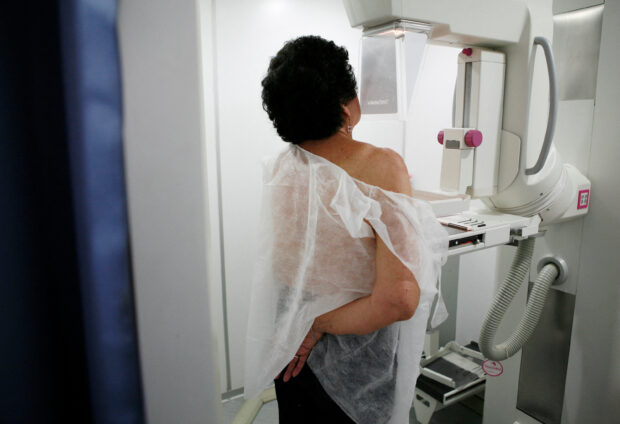
FILE PHOTO: A woman undergoes a free mammogram inside Peru’s first mobile unit for breast cancer detection, in Lima March 8, 2012. REUTERS/Enrique Castro-Mendivil/File Photo
NEW YORK — A new study is raising fresh questions about the value of breast cancer screening in older women, finding that those 70 and older who underwent mammograms were more apt to be diagnosed with tumors posing no threat to their health than those who did not screen.
The study by researchers at Yale Medical School, published on Monday in the journal Annals of Internal Medicine, tracked 54,635 U.S. women 70 and older who received a mammogram – an X-ray of the breast – in 2002. Women who opted for continued screening were compared to those who chose not to be screened.
The researchers found that among women ages 70 to 74, up to 31% of breast cancer cases found among those who underwent mammograms were overdiagnosed – defined as the diagnosis of a medical condition, typically through screening, that otherwise would not have led to symptoms or problems in a person’s lifetime.
As age increased, so did overdiagnosis, the study found. In women ages 74 to 84, that jumped to 47% – and to 54% in those 85 and older.
The study also did not find statistically significant reductions in breast cancer deaths associated with screening.
The rationale for screening is to catch a disease at an earlier stage to improve the chances of successful treatment. Overdiagnosis might lead to unnecessary treatments and the accompanying financial and emotional burdens.
A concern of continued screening in older women is detecting breast cancers that would never become symptomatic, according to study lead researcher Dr. Ilana Richman, an internal medicine physician at Yale Medical School.
“At some point, it’s unlikely that knowing about breast cancer earlier is going to make much of a difference,” Richman said.
The U.S. Preventive Services Task Force, an expert panel that makes recommendations about clinical preventive measures, has recommended that women ages 50 through 74 undergo screenings every two years. But it has said there is not enough evidence to assess the harms and benefits of mammograms for women ages 75 and up. The task force is reviewing a draft recommendation to lower the starting age for regular mammograms to 40.
The American Cancer Society has recommended screening women over 55 if their life expectancy is more than 10 years, whereas the American College of Physicians has recommended discontinuing screening women over 74 for women whose life expectancy is 10 years or less.
“It’s critical for older women who are thinking, ‘Should I continue screening,’ to understand what is the full range of risks and benefits,” Richman said, adding, “I’m interested in what can we do to help women understand their options.”
Oncologists Drs. Otis Brawley and Rohan Ramalingam from Johns Hopkins University wrote in an editorial accompanying the study that physicians need new tools to objectively identify the stage and severity of cancer.